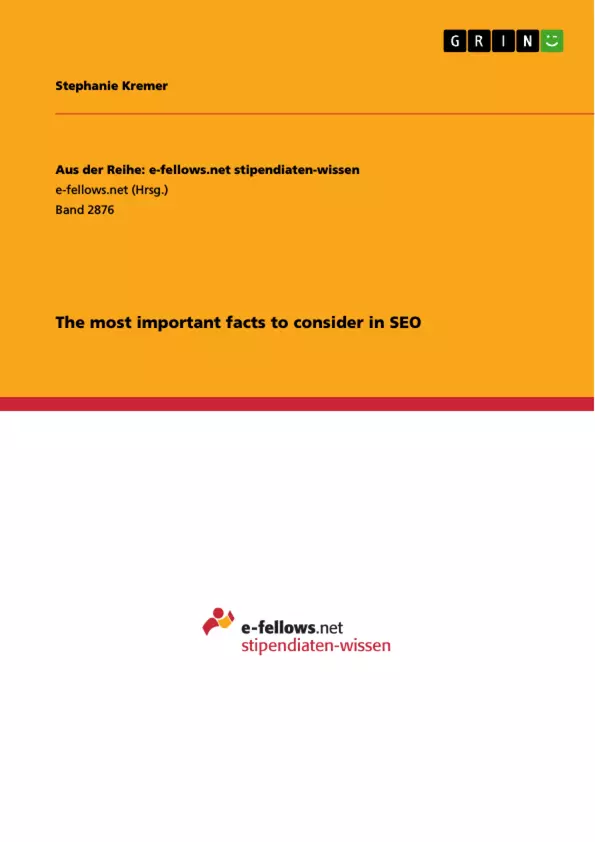Only in Germany, 23.9 million of the over 14-year-old german-speaking population used search engines on the internet for their information search daily in 2017. Compared to 21.08 milion in 2016, this is a growth of 13.38 percent. According to other studies, over 85 percent of all internet sessions start with the type-in into search engines. Therefore, Search Engine Optimization (SEO) offers a huge potential for companies to deliver the right information to interested users when they ask for it actively. To succeed against their competitors, it is important for companies to appear as high as possible in the search engine results pages (SERPs). The question about the most important factors to consider in SEO for good ranking positions is always highly discussed in SEO communities because Google reveals as little as possible to avoid manipulation.
But one thing appears to be clear: because of highly developed machine-learning-algorithms which influence Googles’ valuation of a website for its ranking, classical ranking factors can no longer be used as standard for every search query anymore, but relevant content as well as user experience have become important.
Inhaltsverzeichnis (Table of Contents)
- I. INTRODUCTION
- II. THE END OF CLASSICAL RANKING FACTORS
- III. USER EXPERIENCE (UX) AND USER SIGNALS
- IV. ON-PAGE OPTIMIZATION
- A. Content
- 1) Keywords and WDF*IDF
- 2) Title-Tags and Meta Descriptions
- 3) URLs
- 4) Headlines
- B. Technical Aspects
- 1) Page speed
- 2) HTTPS-encodings
- 3) Site architecture
- 4) Internal links
- 5) Mobile friendliness
- V. OFF-PAGE OPTIMIZATION
- A. Inbound links
- B. Social Signals
Zielsetzung und Themenschwerpunkte (Objectives and Key Themes)
The objective of this paper is to explain the most important factors to consider in Search Engine Optimization (SEO), focusing on Google's algorithm and how it has evolved with the introduction of machine learning and artificial intelligence. The paper explores how traditional ranking factors have become less deterministic and how content quality and user experience have gained significant importance.
- The influence of machine learning on Google's ranking algorithm
- The changing importance of classical ranking factors
- The rise of user experience and content quality in SEO
- On-Page Optimization and its crucial components (Content and Technical Aspects)
- Off-Page Optimization and the relevance of inbound links and social signals
Zusammenfassung der Kapitel (Chapter Summaries)
The Introduction emphasizes the increasing importance of SEO due to the growing reliance on search engines for information retrieval. It highlights the impact of ranking positions on organic clicks and how user behavior in relation to paid ads further underscores the value of organic search results.
The paper delves into the "End of Classical Ranking Factors", explaining how the development and utilization of machine-learning algorithms necessitate a shift in perspective towards a dynamic, query-specific approach to SEO. The introduction of RankBrain by Google in 2016, an artificial intelligence system capable of answering previously unasked queries, further emphasizes this shift.
The chapter on User Experience (UX) and User Signals focuses on the importance of user signals, such as click-through-rate (CTR), time on site, and bounce rate, in Google's ranking algorithm. It emphasizes that these signals are critical for understanding user satisfaction and how well a website fulfills their search intent. The chapter also explores how to optimize user experience through factors like headlines, navigation, site structure, page speed, and mobile friendliness.
The On-Page Optimization chapter examines the key elements involved in designing, structuring, and presenting content for both search engines and human users. This chapter analyzes the significance of relevant content, keyword research, WDF*IDF analysis, title tags, meta descriptions, URLs, headlines, page speed, HTTPS encodings, site architecture, internal links, and mobile friendliness.
The Off-Page Optimization chapter explores tactics to attract traffic from external sources, focusing on the importance of inbound links and social signals. It discusses the role of linkbuilding strategies, the devaluation of low-quality links, and the rising influence of social signals in the mobile search era.
Schlüsselwörter (Keywords)
The paper focuses on the crucial aspects of SEO, particularly in the context of Google's evolving algorithms and the increasing emphasis on user experience. The main concepts include machine learning, artificial intelligence, classical ranking factors, user experience, content quality, On-Page Optimization, Off-Page Optimization, inbound links, social signals, page speed, mobile friendliness, HTTPS encodings, and site architecture.
Frequently Asked Questions
How has Google's ranking algorithm evolved with machine learning?
With systems like RankBrain, Google uses artificial intelligence to understand search intent, making classical ranking factors less deterministic and query-specific optimization more important.
What are the most important user signals for SEO?
Click-through-rate (CTR), time on site, and bounce rate are critical signals that help Google understand how well a website satisfies a user's search query.
What is WDF*IDF in content optimization?
WDF*IDF is a formula used to determine the weight of a word in a document compared to a whole corpus of documents, helping to create more semantically relevant content.
Which technical aspects influence SEO rankings?
Key technical factors include page speed, HTTPS encryption, site architecture, internal linking, and mobile friendliness.
What is the difference between On-Page and Off-Page optimization?
On-Page optimization refers to factors on your own website like content and technical structure, while Off-Page optimization focuses on external signals like inbound links and social signals.
- Arbeit zitieren
- Stephanie Kremer (Autor:in), 2018, The most important facts to consider in SEO, München, GRIN Verlag, https://www.grin.com/document/448433



